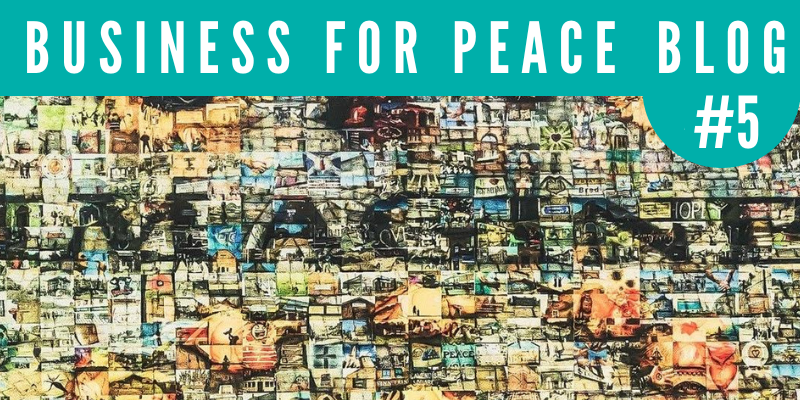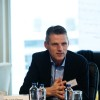A Human Security approach for measuring social impacts
Mark van Dorp, affiliated to LSE IDEAS, looks at how measuring social impacts can make companies’ strategies more risk responsive by using a Human Security approach.

This Blog series follows a workshop hosted by the School for Business and Society at the University of York in conjunction with the Interdisciplinary Global Development Centre. Mark Van Dorp is an Independent Consultant (Bureau Van Dorp) in the field of responsible business in fragile and conflict-affected settings, and affiliated to LSE IDEAS, London School of Economics and Political Science). He joins us in this blog looking at how better measuring social impacts can help companies to understand how their actions impact on the ground so that they contribute to human security.
Over the last two decades, there has been an increased understanding of what is needed for investments to be more peace positive in theory but in practice the necessary actions are rarely being implemented. Experience shows that by better understanding and measuring the social impacts of a business, looking at local material issues that were previously ‘hidden’ but can now be tracked, leads to a better contribution of companies to human security. Human security focuses on the ability of people and communities to live free from fear, want and with dignity. This can be achieved through people-centred, comprehensive, context-specific and prevention-oriented responses that strengthen the protection and empowerment of all people. However, most companies have little or no knowledge about the impact of their activities outside the corporate performance targets. While companies increasingly engage in ESG (Environmental Social and Governance) reporting, this is usually based on high level indicators that do not necessarily correspond to bottom-up data from the local communities in which the company operates.
In order to help address this, I’ve had the opportunity to work with a group of amazing colleagues at LSE IDEAS, the foreign policy thinktank of the London School of Economics, who developed the Human Security Business Partnership framework, with financial support of the UN Trust Fund for Human Security. By using Human Security as a holistic approach to address multidimensional risks for businesses operating in Fragile & Conflict-affected Settings, fragility, human rights and sustainable development are brought together, offering a basis for identifying thresholds of people’s resilience. We looked at how we can actually define and measure the social impacts of companies by using the concept of Human Security. The idea is to look at ways in which we could improve ESG standards and frameworks so that they become more focused on local realities, so that not just the risks to the companies themselves are considered but also the risks to communities as well, something also referred to as the double or dual materiality perspective.
As part of the LSE project, we came up with a matrix that conceptualises companies' social impacts by integrating human security and positive peace and linking them to ESG criteria whilst relating these to the Sustainable Development Goals. This encapsulates the different dimensions of Human Security of economic, food, health, environmental, personal, community/group, and political security.
In rethinking how to measure social impact, the concept of double materiality, meaning that companies have to report about how sustainability issues affect their business and about the company’s impacts on people and the environment, and linking different dimensions into a holistic framework, is key to developing a new approach. It should be noted that the way in which the matrix is applied is very context specific, depending for instance on the level of political stability or fragility.
Figure 1: Human Security Dimensions and Risks mapped against ESG factors and the SDGs
|
Dimension of Human Security |
Examples of risks to security |
ESG classification |
SDG classification |
|
Economic |
Poverty, unemployment, corruption, lack of access to land, water, electricity, credit or education |
Governance and Social |
SDG 1, 4, 7, 8, 9, 11, 16 and 17 |
|
Food |
Natural hazards including droughts or floods, breakdown of supply chains, conflict leading to hunger and famine |
Social |
SDG 2 |
|
Health |
Infectious diseases, malnutrition, lack of access to health care |
Social |
SDG 3, 6 |
|
Environmental |
Environmental degradation, resource depletion, contamination of water supplies, groundwater depletion, natural hazards including droughts or floods |
Environmental |
SDG 6, 12, 13, 14, and 15 |
|
Personal |
Physical (domestic/gender-based) violence, crime, terrorism, child/forced labour, injustices |
Social |
SDG 5, 8 and 16 |
|
Community/group |
Inter-ethnic, identity-based group grievances based on socio-economic & cultural inequalities, lack of social cohesion |
Social |
SDG 5, 10, 11, 16 |
|
Political |
Political polarization, repression, human rights abuses, corruption |
Governance and Social |
SDG 10 and 16 |
Source: LSE IDEAS. 2022. Maximising business contributions to sustainable development and positive peace: A human security approach. Chapter 5: Applying human security and positive peace for social impact measurement of business in fragile and conflict-affected settings (p. 29-34); N.B. the original figure was slightly adapted for the purpose of this blog.
Existing ESG standards and frameworks often allow companies to use ESG criteria and SDG indicators in a selective way, often cherry picking those that are best aligned with their business. In the second phase of our project, that started in September 2022, one of the goals is to turn this around and enable businesses to have a better look at their material impacts on a local level, and then consider how these relate to ESG standards and to the SDGs. This will prompt businesses to ask how they can take better informed decisions on the risks that are having a negative impact on the local context and on local communities. Addressing these risks will ultimately benefit the business and the communities, and eventually lead to more sustainable operations and investments by taking peace positive actions. There is an extensive body of literature that explains how companies can contribute to peace positive outcomes (see for example, Business and Peace – It Takes Two to Tango; A New Crisis Playbook for an Uncertain World; Towards peace-positive investment: Bringing investors and fragile and conflict-affected states together, sustainably) ranging from enhanced human rights due diligence, more inclusive hiring policies and fair wages, to taking the voice of local civil society and communities into account.
The real challenge now is to see how this can be implemented. There is not one standard ESG framework and a lot of companies often struggle with that. We are thinking of smart ways to add a critical local layer to existing standards and frameworks to minimise the additional burden to companies.
Unlike other approaches, our proposal for improving ESG metrics and practices provides room for a shared understanding among all stakeholders which can be applied in peaceful and fragile contexts alike. The advantage of the Human Security approach is that it can serve as a local baseline for change and as a ‘convening concept’ and methodology for generating bottom-up initiatives for peace and development rather than external, top-down interventions.
Furthermore, the model can help to assess multidimensional and interrelated risks between for example conflict and climate change that are often overlooked in the ESG space because it tends to take a very compartmentalised approach. Finally, it can help to better measure these impacts and to help companies understand their real impacts on the ground. In this way, the Human Security approach helps to clarify how diverse issues interact and require comprehensive yet context-specific solutions.
An increased focus on the ‘S’ in ESG suggests that business is becoming more open towards regarding ESG not as three separate silos of responsible business, but as different aspects of the same challenge to demonstrate responsibility and accountability. However, many companies lack the capacity and knowledge of how best to do so. There is a real momentum for the Business for Peace community to fill this gap and to work with the business community on how to operationalize this. The challenge now is to turn the ideas put forward in this blog into practice by engaging with those stakeholders that have the courage and willingness to make a real and lasting change on the lives of local communities.
Listen to Mark’s talk here to find out more about his journey into business for peace as an economist. For more details on this new approach to measuring social impact by using Human Security and Positive Peace, you can read the Policy Brief that Mark co-authored with Marcel Smits. Mark would like to thank Mary Martin, Vesna Bojicic-Dzelilovic (both of LSE IDEAS) and Marcel Smits (FCS Impact) for reviewing this blog.
Other Blogs in the Series:
Blog#1: New Developments in Business for Peace and the Role of Companies in War Zones by Chris Williams
Blog#2: Leading Organisations in and after Violent Conflict by Joanne Murphy
Blog#3: Delivering Measurable Social Impact through the Environmental Social and Governance (ESG) movement by Jason Miklian
Blog#4: Business - When Crisis Hits
Contact us
Interdisciplinary Global Development Centre
igdc@york.ac.uk
01904 323716
Department of Politics and International Relations, University of York, Heslington, York, YO10 5DD, UK
Twitter
|
|
Mark van Dorp |
|---|---|
|
|
Mark van Dorp is an economist with over 25 years of professional experience in the field of Private Sector Development, Value Chain Analysis, responsible business, ESG (environmental, social and governance) issues, SME support, conflict-sensitive and peace-positive business, and human security, with a focus on fragile and conflict-affected settings. He has worked worldwide in many fragile settings, including Cameroon, Democratic Republic of Congo, Ethiopia, Liberia, Mali, Mozambique, Nigeria, Rwanda, South Sudan, Sudan, Colombia, Iraq, Lebanon and Pakistan. Over the last 15 years, Mark has focused on action-oriented research and consultancy work on how to strengthen investors’ and companies’ strategies and operational capacity to work in a responsible way in fragile settings, as well as to improve value chains and support SMEs, with the ultimate goal to contribute to equitable development and peace building. In addition to his work as an independent consultant, since April 2022, Mark also works as a Research Associate with LSE IDEAS, the foreign think tank of the London School of Economics and Political Science.
|
Contact us
Interdisciplinary Global Development Centre
igdc@york.ac.uk
01904 323716
Department of Politics and International Relations, University of York, Heslington, York, YO10 5DD, UK
Twitter
